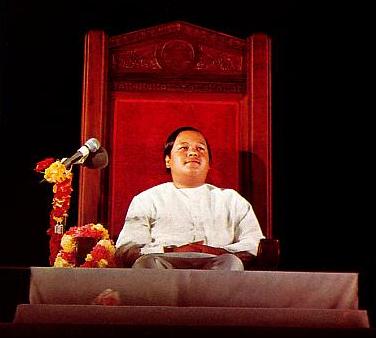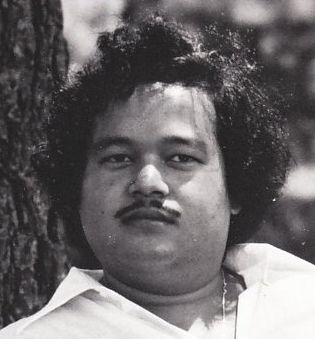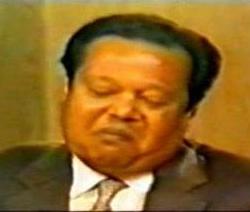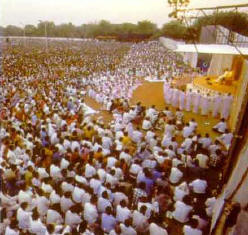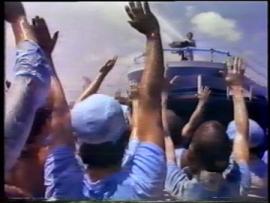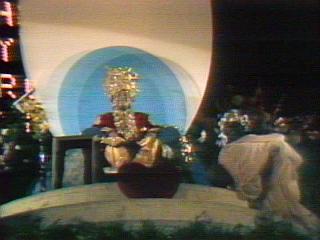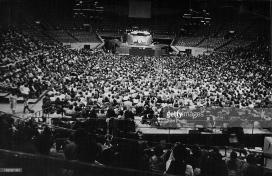Is Prem Rawat the Head of A Cult?
It is perhaps only fair to first ask: Why should the 'cult question' be put in relation to Prem Rawat? In the early days of the western Divine Light Mission the cult label was largely a response by a sceptical media and distressed family members toward an individual and organisation that were quite literally, foreign to them. Forty years on Prem Rawat and the organisations that support him, have four decades of activity on which to be judged and which provides a 'case to answer'.
In comparison to the Divine Light Mission of the 1970s, the present day organisations lack obvious hysterical devotion and are largely devoid of religious symbolism; Prem Rawat is presented as an inspirational speaker not a divine personage and the organisations are presented as philanthropic and educational, not iconoclastic and proselytising. Yet the characteristics of a cult are evident.
If the CSJ Criteria are used as the test against which Rawat's supporting organisations are judged, then the first test "great or excessive devotion or dedication to some person, idea, or thing", is undoubtedly met; Prem Rawat remains an object of dedication, and for many followers an object of devotion, even worship.
The second test of the CSJ criteria is complex, certainly the Rawat organisations do not show evidence of the aggressive manipulation which does take place in some cultic organisations. A critical view of the Rawat organisations however must conclude that there are subtle processes which look to be coercive and persuasive, designed to alter the individual's thinking.
The third test of the CSJ criteria "designed to advance the goals of the group's leaders" as with the first, is unequivocally met by the Rawat organisations. No national or international Rawat supporting entity has members - other than where provided for Prem Rawat to appoint them ! There is no provision for the followers of Prem Rawat, nor those providing financial support, to influence or have any say in the priorities or running of the Rawat organisations.
The final test of the CSJ criteria "to the actual or possible detriment of members, their families, or the community" sets the interests of the group leaders - Prem Rawat and his close associates - in contrast with the interests of his followers and a wider community. It is difficult to see how the Rawat organisations not meet this test in that no obvious benefit accrues to any society where the Rawat organisations operate but Prem Rawat benefits considerably. The Rawat organisations support his lifestyle with the provision of a $US 60 million jet, hotel expenditure of over $US 10,000 per night, and a process of adulation and aggrandisement comparable to that enjoyed by a media celebrity.
The Singer Criteria of cult qualities
Seven of the eight points of the Singer criteria are met by the Rawat organisations.
1. It is the Rawat organisations' contention that Prem Rawat is somehow separate from the organisation, however as there are no processes of separation and all the managers of the various operations accede to Prem Rawat as their master/teacher/inspiration it is clearly the case that Prem Rawat 'leads' the organisations. It is also unequivocally the case that Prem Rawat is charismatic, determined and domineering
2. As leader of the organisations, Prem Rawat is self-appointed and he has a claim to have a special mission in life, he answers to no higher authority, such as an oversight board and is the sole interpreter of doctrine and policy and these are subject to change frequently and whimsically by Prem Rawat.
3. The organisations centre veneration on Prem Rawat directly, rather than on God, a higher political power, or science or any other ideal.
4. The structure of the organisations is hierarchical and authoritarian. There are no elections, nor even the simplest means for individuals to express their concerns - merely frequent opportunities to express gratitude to the leader.
5. While the Rawat organisations are ultimately totalitarian, they do not by and large have elaborate rules and rituals that occupy large parts of every day.
6. The Rawat organisations have two distinct sets of ethics: There are numerous examples of how Prem Rawat is excused the normal expectations of behaviour that would apply to any individual participating in the organisations.
7. The Rawat organisations are founded upon the innovative and exclusive possession of 'Knowledge'.
8. The Rawat organisations have two main purposes: recruiting new members and fund-raising.
If the Singer Criteria of qualities seen in cults are used as the sole test, then unequivocally the Rawat organstions comprise a cult !
The Singer Criteria of Coercive Thought Reform
The operation of the Rawat organisations is an apparently very relaxed affair, it does not promote itself aggressively, it does not send its supporters onto the streets to proselytise or preach, indeed its main recruiting process is through personal recommendation and passive Internet advertising. Prem Rawat's followers are encouraged to target family and friends for 'introduction' to Prem Rawat's message. The use of Coercive Thought Reform in that 'introduction' is subtle but nevertheless it is evident.
1. Step Changes : Individuals are introduced to the concept of Prem Rawat and his 'Knowledge' via the personal approach of existing followers in social or work environments. The individual is encouraged to accompany the follower to a video, satellite or public presentation by Prem Rawat. There is a gradual affirmation that Prem Rawat is 'special' and that the 'gift' he has to offer is 'special.
2. Control of Time: Those who become engaged in the 'social' experience of the Rawat organisations are encouraged to spend time concentrating on Prem Rawat's personal message - this has been formalised into a system of Keys, which comprise over 100 hours of DVD presentation which those who wish to seek initiation into the meditation, must watch before they are considered 'ready'.
3. Replacing Social Support: The volume of time demanded by the preparation process - watching videos, and the social replacement provided by the company of premies removes the aspirant from existing support processes making them dependent upon the Rawat organisation culture.
4. Manipulation of Experience: Whilst Prem Rawat is currently ambiguous in his instruction on how much an initiate should meditate, in the past prolonged meditational sessions were recommended, indeed the 'breath' technique was suggested to be perpetually practised. Such prolonged meditation undoubtedly served to "inhibit behaviour that reflects the person's former social identity" and clearly fulfilled Singer's criterion. For individuals experiencing emotional fragility what serves as 'prolonged' in Singer's terminology becomes an acute question and single 'daily' hour long meditations may profoundly affect an initiate's ability to maintain their former social identity, making them vulnerable to manipulation.
5. Belonging: Group approval within the Rawat organisations is subtle but it is present and demonstrating an understanding and acceptance of the group's beliefs is rewarded with approval, while questioning, expressing doubts or criticising are met with explicit disapproval, and possible rejection. Indeed Prem Rawat instructs his followers that they must not 'doubt'.
6. Power of the Leader: The entire philosophy underpinning the Rawat organisations is based on a closed system of logic which itself is dependent on the authoritarian role of Prem Rawat. Structures which permit feedback are absent from the Rawat organisations and modifications to the organisation are unachievable without explicit executive order from Prem Rawat. The Rawat organisations have an unalterable pyramidic structure with Prem Rawat irreplaceable at the apex. Only those who accept this unalterable 'reality' are accepted within the organisations.
Tested against the Singer criteria, it is clear that Coercive Thought Reform is an integral part of the operation of the Rawat organisations.

